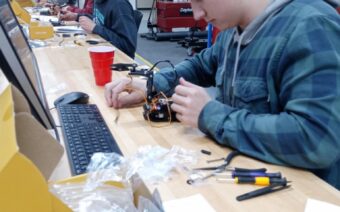
March 10, 2023
NORTHEAST WISCONSIN – Times seem to be changing in workforce hiring practices.
Within the last year, according to a survey done by Intelligent, a research website tailored for students, 34% of companies have eliminated college degree requirements in order to increase their talent pool, nationally.
How does that translate for the job market in Northeast Wisconsin?
Some businesses have changed their hiring processes and many schools have adjusted the way they help students build resumes with one goal in mind – keep the job force going and the talent flowing.
What are companies looking for?
When it comes to the hiring process, every company is looking for different qualifications to meet their standards and needs.
For Georgia Pacific (GP), Public Affairs Manager Chris Brennan said the company looks for two characteristics when interviewing applicants – talents and virtues.
“The talents – could be technical skills and experience someone has – which are certainly important, but we also pay attention to their virtues,” he said. “In other words, are they problem solvers? Can they work well on a team? Are they good communicators? Do they have a willingness to continuously learn? Are they contribution-motivated and can they think outside the box?”
Brennan said applications are processed through GP’s Applicant Tracking System (ATS) and then reviewed thoroughly, but the company tends to focus more on the conversation with the candidate versus the application.
Applicants for GP must meet basic qualifications for the roles they apply for, however, Brennan said in the operations space, GP’s qualifications are minimal.
“We do not put an emphasis on degree or background, but focus on the candidate and their motivations,” he said. “Yes, we love for applicants to have some technical experience – previous manufacturing employment, a farming background, military experience – but we will train people who have none and want to have a career in manufacturing.”
DJ Braemer, director of talent acquisition at Oshkosh Corp, said while there are certain requirements that need to be filled for certain positions, one of the foundational things he focuses on are the characteristics of the applicant.
“We typically start with a phone interview as the first step,” he said. We’re looking for… things like communication skills, examples of building relationships, how they work collaboratively as part of a team.”
Kirk Kallio, Director of Human Resources at Waupaca Foundry, shared a similar sentiment.

At Waupaca Foundry, Kirk Kallio, director of Human Resources, said not all positions require a degree. If the candidate is a right fit and has the skill set, he said the foundry will provide hands-on experience and additional schooling if needed. Photo Courtesy of Waupaca Foundry
“I have had folks who have the skill set needed but have not hired (because) I don’t think they fit the same culture,” he said.
Degree vs. skill set
When it comes to reviewing applications sent to Oshkosh Corp, Braemer said the requirements vary for each job.
For example, he said engineering positions need some sort of degree in the field.
“It’s the technical nature of the job,” he said. “They are truly using what they learned through the academic side and through schooling to get that job.”
With other jobs, like human resources and finance, Braemer said the company has loosened the traditional requirements over time, taking a more skills-based approach when viewing applications.
In fact, Braemer said the entire talent acquisition team at Oshkosh Corp has had training on how to look at candidates and their resumes through a skills-based lens with Rework America Alliance.
“(The training) is trying to open up the doors for those that have had barriers to education and couldn’t get the degree but still have great skills to offer,” he said. “My team is not looking at resumes – they’ve got a new mindset of ‘how can this person’s skills translate to the job, even if they’re missing a degree? How do we assess the skills of this person and not only look at the education or years of experience?’”
Having a skills-based philosophy, Braemer said, goes hand in hand with diversity, equity and inclusion at the company.
“Again, you’re opening up your talent pool to those that maybe have had barriers to getting a degree,” he said. “There is great talent out there that does not have a degree we’ve seen come into our organization who maybe five years ago – when we had a stricter degree policy – we never would have considered. Now we’re reaping the rewards of this great talent that is now able to work for us because we’re looking at it from a skills-based perspective.”
The company also has a tuition reimbursement program for those coming in without a degree who may need academic experience down the line.
“In order to get promoted up to a certain level or continue their journey upward through the company, they may come to a point where they need a degree,” he said. “I think that puts us in a nice position to be able to say, ‘Hey, we’re going to bring you in without the degree. If your career journey is to go XYZ – and we do require a degree for that – at that point, we’re going to help you get there by covering the tuition costs.”
Kallio said when he’s going through the hiring process at Waupaca Foundry, the way he views resumes also changes by position.

Jennifer Parks-Tigert, manager of Career Services at Northeast Wisconsin Technical College (NWTC), said now more than ever, she’s seeing companies put a heavy focus on soft skills instead of degree requirements on resumes. Photo Courtesy of NWTC
“If I’m looking to hire a project engineer or mechanical engineer for the plant when I look at a resume, I may not have to look at somebody coming right out of school,” he said. “But even in that area, once they’ve graduated college, do they have to have an actual ME degree to be a project engineer for us? Not necessarily… Let’s say I’m looking to fill a production, hourly position. I’m looking at work history. I just want to know, ‘Are you able to keep your job?’”
For certain positions, such as an industrial mechanic and mechanic maintenance, Kallio said Waupaca Foundry will provide hands-on training, as well as put them through schooling at the tech to pick up on “helpful areas,” such as hydraulics training.
When it comes to positions at the foundry like a tooling or pattern engineer, Kallio said it’s beneficial for there to be a mix of employees with degrees and without, as they lean on one another with their different expertise.
“We have so much experiential knowledge from out in the plant… I would say (company) knowledge… And yet those young people we hire out of college, they have none, but yet they also have the technical skill sets that the other folks that have the experiential knowledge don’t have,” he said.
Jennifer Parks-Tigert, manager of Career Services, and Riley McDermid, dean of Learning Effectiveness and Early College at Northeast Wisconsin Technical College (NWTC), said they have noticed more companies lessening their application requirements in order to widen their talent pool.
“I think in general, a lot of employers have changed their hiring requirements to ensure they have a bigger pool of candidates,” Parks-Tigert said. “In order to do that, they’ve had to lessen some of the technical skills required because the technical skills are teachable. Those soft skills and personality characteristics aren’t often trainable, so they’re trying to assess and fill talent based upon some of those important personality characteristics.”
Those soft skills, Parks-Tigert said, can include being a team player, communicating effectively and being a problem solver.
McDermid said the current shortages the Northeast Wisconsin labor market is experiencing is part of the reason companies are changing their degree requirements.
“(We have) an aging workforce – a lot of retirement,” she said. “Therefore, there’s a skills gap. So, whether they’re formally changing the job description or reading through the applications differently, they are trying to hire based on bodies in the seats and based on what they can teach and maybe what their gaps are.”
Since more companies are willing to hire applicants on the basis, they can teach the technical skills needed for the job, McDermid said it’s up to institutions, like NWTC, to teach the soft skills – including communication and professionalism.
“If (companies) can hire someone and teach them to be a phlebotomist, then we can teach them to have good customer service and professionalism,” she said. “That’s the kind of partnership in our current reality.”
Jessica Lambrecht, executive continuing education and community engagement officer at the University of Wisconsin-Green Bay (UWGB), echoed the sentiment.
“I think a lot of employers are in a position where they’re challenged in meeting their workplace needs because of supply chain, talent and skill, what’s available to them,” she said. “So, I think our employers are making more compromises… recognizing if they don’t have a huge applicant pool in one space or another, they’re willing to adjust their degree requirements to be more accessible to an underrepresented population.”
In fact, hiring trends have changed drastically enough to where Lambrecht said UWGB’s division of Continuing Education & Community Engagement is working to adjust the needs of their students.
“We’re doing a lot of revisioning of career services,” she said.

Dr. Chris Matheny, president of Fox Valley Technical College (FVTC), said school and work go hand in hand for lifelong learning. Photo Courtesy of FVTC
While many businesses are hoping to open up their talent pool with fewer requirements, both McDermid and Lambrecht said there are still positions where a degree is necessary.
“Certainly in the field of health there’s still a degree requirement because there’s still a state licensure or a national board certification requirement,” McDermid said. “In no way shape or form could a respiratory therapist do a couple of micro-credentials, stack them up and be ready to go on the floor.”
Dr. Chris Matheny, president of Fox Valley Technical College (FVTC), said learning doesn’t end with school or with a job.
“What we’ve seen and what we’ve observed on the employer side for a long time, is they are interested in growing individuals throughout their degree program – whether that’s by supporting them to degree completion or by offering additional certification training,” he said.
Instead, Matheny said, they work in tandem.
“What we’re seeing right now is this idea that it’s not work or go to school, it’s work and go to school,” he said. “And working and going to school means finding the appropriate degree or credential for the job you’re growing into, while the employer is using the skill set you already have. We need to recognize individuals are learning things on the job that are applicable in school and vice versa.”
?Making sure it’s a good match
At Unext, founder Tyrone Powell works with students to make sure they’re a good match for a career field when entering the workforce.
One of the services Unext offers, Powell said, is helping students build their resume to make sure it passes through the Applicant Tracking System (ATS), which he said many companies use when going through the hiring process.
“Almost every employer we’ve talked to (uses an ATS),” he said. “That impacts resume building, and what the students should put in their resume.”
Once a student creates a profile with Unext, Powell said there are different sections of a resume builder they will work through.
Powell said Unext then uses AI and algorithms to identify the strong and weak words on the resume.
If the student’s resume contains weak words, he said Unext will “highlight those words and give them live feedback.”
If the student’s resume contains strong words, such as “builds” or “sustains,” Unext will “highlight it in green and give them positive reinforcement.”
“We also have another aspect we take into consideration: soft and hard skills,” he said. “We want to make sure we identify them and display them in the resume, as well as measurable metrics from the opportunities or experiences they have.”
When NWTC helps students build their resumes, Parks-Tigert said they go through a similar process.
“We’re teaching students to look at the job posting and make sure they’re embedding the key words and qualifications for each specific job into the resume, and then changing that with each job they apply for,” she said. “It’s a combination of the transferable skills – the skills they’ve gained through prior work experience – and it’s also the soft skills.”
For students at UWGB, Lambrecht said they focus heavily on transferable skills.?
“It’s important in today’s economy and business environment students have relevant projects and internships and all kinds of different variations of work-based experience to show their soft skills, their reading abilities and technical experience,” she said. “We also do a lot to help students craft their resume to speak the language of the employer, as that’s often a huge disconnect for a lot of job seekers.”
On top of a strong resume, Powell said students who do internships or job shadowing tend to be at an advantage when applying for jobs.
“It allows them to build familiarity with employers, so they already know what the company looks like, what their culture is and what the job entails,” he said. “They can say, ‘I have shadowed these employers. This is what I’ve learned in the industry. This is how I know this major is the right one for me.’ And they will be a lot more comfortable talking about their experience.”
Since founding Unext, Powell said it seems a lot more employers are noticing the benefits of shadowing opportunities and want to offer more structured shadowing programs.
Agreeing, Braemer said Oshkosh Corp has partnered with Michigan Tech, the University of Wisconsin-Madison and other colleges to bring students in as interns with hopes they will come work with the company full-time in the future.
“(The program) helps us build the talent pipeline all the way at the beginning, so that does become a little bit easier,” he said.
For students looking for advice on finding jobs post-grad, Powell said it’s important to make sure they understand what the company does and its culture and values and to make sure they are updating their resume based on the job they are applying for.
Kallio agreed, saying he wants somebody who will “actually engage” with him and their hiring manager in the interview.
“I want somebody who’s inquisitive and who asks questions,” he said. “I want somebody who is interested in listening to what I or the hiring manager have to say… I want somebody to ask me about our culture, about the department they’re going to or the type of work they’re doing.”
Unext isn’t the only organization making sure students have what they need to become a good match for companies.
Matheny said FVTC offers several programs to help prepare students for the workforce through its employment connections office.?
“(It’s) all about connecting students with employers’ needs and connecting employers with our students,” he said. “There’s a posting service for employers to review resumes, do mock interviews and general coaching on employment.”
Matheny said FVTC is always focused on helping students demonstrate skills for employers.
“Because at the end of the day, the degree is a signal of a skill set an individual has gained,” he said.
Lambrecht said UWGB offers about a dozen different certificate programs that allow for the community to continue to learn specific information they may need without having to go through an entire college course again.
“We offer so many short-term, real skills, fast pace and immediate information for the community,” she said. “To get folks to think about continuous learning is the specialty of our area. As learners, we now live in an environment of such fast pace knowledge… The faster you have the information, the better and more equipped you can be in your role.”
 Hi Tec Fabrication – welding dreams, seam by seam
Hi Tec Fabrication – welding dreams, seam by seam A menagerie of alpacas, llamas, porcupines, more
A menagerie of alpacas, llamas, porcupines, more








